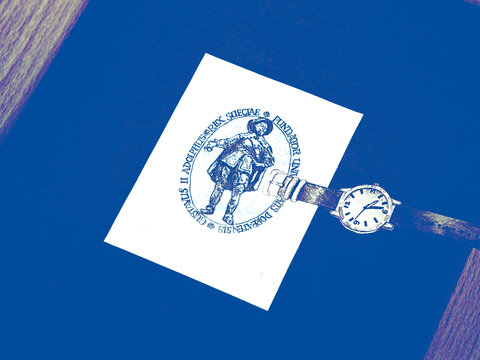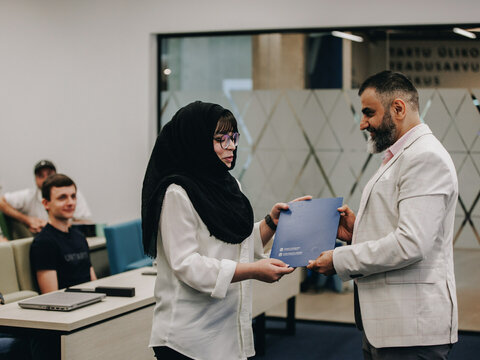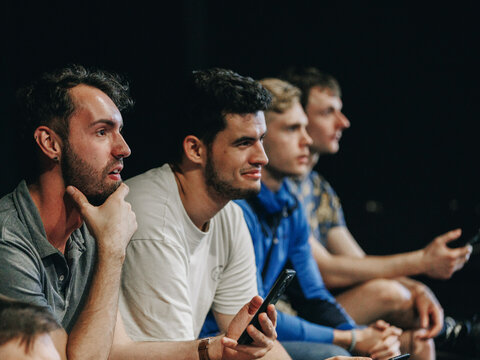Civic Competence in Creative Cities - How digital Innovations Contribute to Durable Democracies (internet voting)
-
Credits
2 ECTS (52 hours)
Form of study
Entirely web-based
Location
Veebis
Fee
free
Teachers
Vincentius Martinus Franciscus Homburg
Study group
Political sciences and civics
Program language
English
Purpose:
The course aims to introduce students to the background and current manifestation of Internet voting in Estonia, and to enhance students' research skills by presenting and discussing conceptual and (quantitative) empirical studies on diffusion and impact of internet voting among the Estonian electorate.
Target group:
BA/MA/PhD students in social sciences, political science, public administration, information systems
Outcome:
Upon completing the course, students will be able to:-describe the background and implementation of internet voting in the context of Estonian e-governance / Estonia as a digital society;
-identify and create indicators for evaluating the diffusion and impact of internet voting;
-design research projects with which diffusion and impact of internet voting are explained; and
-interpret findings from internet voting studies and translate these findings into policy recommendations in relation to possible uses of internet voting.
Starting conditions:
Participants are expected to have an advanced BA-level / MA-level understanding of social science theories in the field of democracy, public organization and political science, and have acquired skills in analysis of quantitative data (more specifically multiple regression techniques)
Teachers:
Vincentius Martinus Franciscus Homburg - Vincent Homburg is the full Professor of e-Governance and the holder of the ERA Chair of e governance and digital public services at the University of Tartu.Content:
| Topic | Credit | Lectors |
|---|---|---|
| 1. Internet voting (introduction, context and core concepts) Adoption rate and use of internet voting |
17 | Vincentius Martinus Franciscus Homburg |
| 2. Impact of internet voting Behavioural aspects of internet voting |
17 | Vincentius Martinus Franciscus Homburg |
| 3. Trust and distrust in internet voting Internet voting in Estonia: Estonian exceptionalism? |
18 | Vincentius Martinus Franciscus Homburg |
Price info:
The course is free of charge for those who took part in SVJS.TK.069
Location info:
The course takes place in the Moodle online environment. The course is scheduled in three (consecutive) weeks. Each week, students are tasked to watch short videos (asynchronously) and read two research articles on diffusion and impact of internet voting. Each week there will be an online class on Zoom (synchronously), in which students are offered the opportunity to come up with questions, and in which the details of the research designs and findings will be discussed. Each week, there will be an exam (weeks 1 & 2: online multiple choice test, week 3: oral examination of the whole course by the instructor).
Learning environment:
Learning takes place in the online learning environment, which presupposes that students have good ICT and web communication skills.
Schedule and further information:
This course offers a 2 ECTS extension to the in-person Summer University course and focuses on practices and impacts of internet voting in Estonia. Estonia is the only country in the world that has been consistently offering internet voting (alongside postal voting and in-person voting) in elections over 19 years (2005 - now). One of the most frequently asked questions by political scientists is how internet voting works and what its behavioural impacts are. In this online extension, these (and other) questions are answered by presenting and discussing empirical studies (based on log analyses and surveys). The course focuses on the backgrounds and implementation of internet voting in Estonia, and discusses quantitative studies on diffusion and impact of internet voting in Estonia.
Requirements to complete:
Students need to score at least 33% of each multiple choice and oral exam. Minimum scores E for each of the tests exams
Outcome method:
differentiated (A, B, C, D, E, F, not present)
Grading method:
The assessment method consist of the following:-Multiple choice exams (67% of the final grade)
-Oral exam (33% of the final grade)
Grading criteria:
Multiple choice exams (MC) - There will be two MC tests (max. 25 minutes, one resit if needed), maximum allowed time for each test is 25 minutes. The assessment criteria includes:
F – substandard score on MC tests.
E – 50% score on MC tests
D – 60% score on MC tests
C – 80% score on MC tests
B – 90% score on MC tests
A – 100% score on MC tests
Oral exam - There will be an oral exam (20 minutes max) related to learning objectives 2, 3 and 4), with a focus on application, evaluation and creation. The assessment criteria includes:
F –insufficient reflection and understanding of impact studies on internet voting, as evident in oral exam.
E –sufficient understanding of findings of impact studies on internet voting, limited reflection as evident in oral exam.
D –sufficient understanding and sufficient reflection of impact studies on internet voting, as evident in oral exam.
C –good reflection and understanding of impact studies on internet voting, including some methodological reflection as evident in oral exam.
B –good reflection and understanding of impact studies on internet voting, sufficient methodological reflection as evident in oral exam.
A –advanced reflection and proven understanding of impact studies on internet voting, including advanced methodological understanding as evident in oral exam.
Document to be issued:
Certificate of completion
Additional information:
Kerli Klock, kerli.klock@ut.ee, +372 +372 737 5937
Program code:
SVJS.TK.070
General contact:
Similar lifelong learning courses
Time of occurrence:
29.08.2024
-
29.08.2024
Credits: 0.5 ECTS (12 hours)
Form of study: Partially web-based
Language: Estonian
Time of occurrence:
28.07.2024
-
11.08.2024
Credits: 3 ECTS (78 hours)
Form of study: Classwork
Language: English
Time of occurrence:
22.08.2024
-
22.08.2024
Credits: 0.25 ECTS (6 hours)
Form of study: Classwork
Language: Estonian
Time of occurrence:
28.07.2024
-
07.08.2024
Credits: 3 ECTS (78 hours)
Form of study: Partially web-based
Language: English
Time of occurrence:
28.08.2024
-
28.08.2024
Credits: 0.25 ECTS (6 hours)
Form of study: Classwork
Language: Estonian





